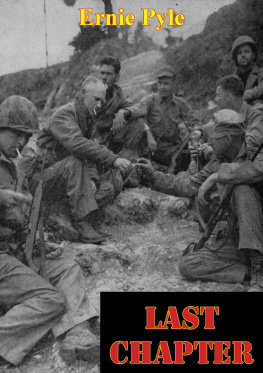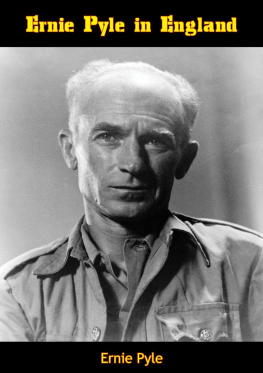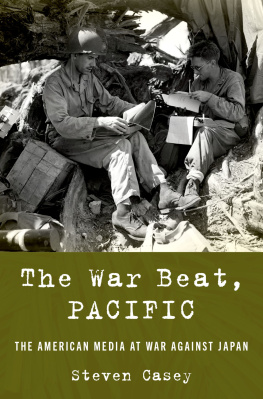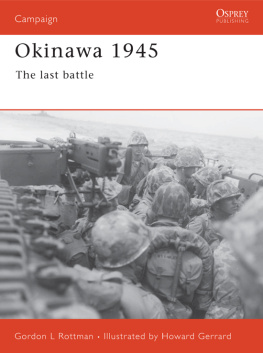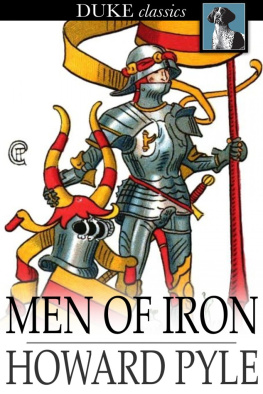

This edition is published by PICKLE PARTNERS PUBLISHINGwww.picklepartnerspublishing.com
To join our mailing list for new titles or for issues with our books picklepublishing@gmail.com
Or on Facebook
Text originally published in 1946 under the same title.
Pickle Partners Publishing 2015, all rights reserved. No part of this publication may be reproduced, stored in a retrieval system or transmitted by any means, electrical, mechanical or otherwise without the written permission of the copyright holder.
Publishers Note
Although in most cases we have retained the Authors original spelling and grammar to authentically reproduce the work of the Author and the original intent of such material, some additional notes and clarifications have been added for the modern readers benefit.
We have also made every effort to include all maps and illustrations of the original edition the limitations of formatting do not allow of including larger maps, we will upload as many of these maps as possible.
LAST CHAPTER
BY
ERNIE PYLE
TABLE OF CONTENTS
Contents
FOREWORD
THIS is the final book of Ernie Pyles war reporting. After Africa, Italy, and D-Day on the European continent, Pyle took it the hard way again. There was still the Pacific war to win, and where the fighting was Ernie had to go, soul-sick though he was with the thousands of scenes of death and destruction he had already witnessed.
He was attached to the Navy early in 1945. In the Marianas first and then living with the boys who flew the B-29s over the Japanese homeland, Pyle was experiencing a side of the war that was new to him. Next he joined an aircraft carrier on the invasion of Okinawa. He made the landing with the Marines and saw Okinawa secured.
Then his luck ran out. A Japanese bullet killed Ernie Pyle on April 17th, 1945 on Ie Shima, and Americans lost their greatest and best-loved correspondent. Millions mourned the going of this modest man who wrote of the war with all honesty and no pretensions, and whose writings will stand as one of the most vital records of the struggle. LAST CHAPTER is a brief, brave little book to complete that record permanently. There is a sixteen-page picture section and an index of names and places.
CHAPTER ONETO THE PACIFIC WAR
THE hour of leaving came at last.
When starting overseas, you dont usually get away on the day the transportation people originally set for you. I remember when I first started going to war, how impatient I was at delay, and how I fretted myself into a frenzy over waiting. But time changes things like that. Now, although there was a delay of a few days, I welcomed every one of them with a big embrace. I felt like saying to it, Ah, my love, you are the day of my dreams. You are my one more day of securityhow I cherish you.
But the final day cameearly in February 1945and at last the hour. I put on my uniform again and sent my civilian clothes to a friend in Los Angeles to keep for me.
It was night when we left San Francisco. We flew in a huge four-motored land plane operated by the NATS (Naval Air Transport Service). The Armys equivalent is the ATC. Ive flown on both of them so much I feel like a stockholder. They fly all over the world on clocklike schedule, over all the oceans and all the continents, carrying wartime mail and cargo and passengers. Ive flown the Atlantic four times, but this was my first flight across the Pacific. Its nonstop from California to Hawaii, about the same distance as crossing the continent, yet it was as easy as flying from Albuquerque to Los Angeles.
We left shortly after suppertime, and were over Honolulu a little after daylight next morning. Soon after we took off I got some blankets and lay down on the floor in the rear of the plane. When I woke up it was just getting daylight, and we had only an hour to go. Thats the way I like to fly an ocean.
All of us had left California in our winter woolen uniforms. When we stepped out of the plane in Honolulu, those heavy clothes almost made us sick. By the time we got through the landing formalities and left the field, we were all dripping and swabbing ourselves.
In Honolulu I stayed in the home of a naval friend. The first thing I did was take a shower, change to light khaki clothes, and eat a plateful of beautiful yellow papaya. A wonderful feeling of tropical well-being came over me. A naval houseboy named Flores, a native of Guam, took care of us. He washed our clothes and made our beds and fixed us fruit juice and papaya all day long. A squat Hawaiian woman, in blue slacks and with a red bandanna around her head, watered the lawn over and over and over again, very slowly. The sun shone bright and white clouds ran an embroidery over the ridges of the far green hills. Palm trees rustled like rain, and the deep whistles of departing ships came from the harbor below us. This, truly, was the Pacific. The trip over had not exhausted me, but the change of climate did, and for a day I did nothing but loaf, and bask in being warm.
Then I started making the rounds to complete my Navy credentials, and to see friends. Lieutenant Commander Max Miller and I stocked up with cigarettes, against the possibility of shortages farther west. Actually we could have bought cigarettes (our favorite brand, too) right downtown in Honolulu. There was no rationing of anything in Honolulu, and no longer any blackout either. Rationing didnt exist because practically everything there was considered military, and also because shipping space from the mainland was an automatic rationer.
The great number of uniforms on the streets and the ten-oclock curfew were the ever-present reminders of the war; those and the vast growth of construction that had occurred since Pearl Harbor. Otherwise war seemed far away. The grimness of Pearl Harbor Honolulu was gone. In many respects a newcomer, beguiled by the soft climate and the loveliness of everything, felt more remote from the war than he did back home.
And so I treated my little Honolulu interlude as another reprieve. I sat with old friends; I made a sentimental visit to the small tropical apartment on Waikiki where That Girl and I lived for a winter seven years ago; I went to parties and listened almost tearfully to the sweet singing of Hawaiians. I relished the short time there in complacency, and didnt even pretend that I was starting out to report the Pacific war. All that would come soon enough.
Covering this Pacific war was, for me, like learning to live in a new city. The methods of war, the attitude toward it, the homesickness, the distances, the climateeverything was different from what we had known in the European war. At first, I couldnt seem to get my mind around it, or my fingers on it. I suspected it would take months to get adjusted.
Distance is the main thing. I dont mean distance from America so much, for our war in Europe was a long way from home too. I mean distances after you get right on the battlefield. The whole Western Pacific is our battlefield, and whereas distances in Europe are at most hundreds of miles, out here they are thousands. And theres nothing in between but water. A man can be on an island battlefield, and the next thing behind him is a thousand miles away. One soldier told me that the worst sinking feeling he ever had was when, after landing on an island and fighting for three days, he looked out to sea next morning and found it completely empty. The entire convoy had unloaded and left for more and, boy, did it leave him with a lonesome and deserted feeling!
Next page
